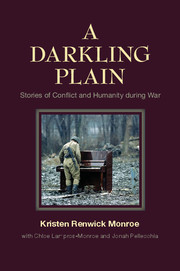Book contents
- Frontmatter
- Epigraph
- Contents
- Preface
- Introduction
- Part one War is a Terrible Thing!
- Part Two Guarding One’s Humanity During War: World War II
- Part Three Other Voices, Other Wars: From Indochina to Iraq
- 8 For My Family
- 9 Bad Memory, Bad Feeling
- 10 Someone Loving Me
- 11 Collateral Damage and the Greater Good
- 12 Easily the Worst Experience of My Life
- Part Four Civil Wars and Genocides, Dictators and Domestic Oppressors
- Part Five My Story, Your Choice How to Use it
- Conclusion
- Bibliography
- Acknowledgments by the Senior Author
- Index
11 - Collateral Damage and the Greater Good
Doc, on the Iraq War
Published online by Cambridge University Press: 05 October 2014
- Frontmatter
- Epigraph
- Contents
- Preface
- Introduction
- Part one War is a Terrible Thing!
- Part Two Guarding One’s Humanity During War: World War II
- Part Three Other Voices, Other Wars: From Indochina to Iraq
- 8 For My Family
- 9 Bad Memory, Bad Feeling
- 10 Someone Loving Me
- 11 Collateral Damage and the Greater Good
- 12 Easily the Worst Experience of My Life
- Part Four Civil Wars and Genocides, Dictators and Domestic Oppressors
- Part Five My Story, Your Choice How to Use it
- Conclusion
- Bibliography
- Acknowledgments by the Senior Author
- Index
Summary
Referred to as the Second Gulf War, Operation Iraqi Freedom, or the Occupation of Iraq, the controversial Iraq war began on March 20, 2003, when the United States and the United Kingdom invaded Iraq. Before the invasion and following the bombing of the World Trade Center and the Pentagon on September 11, 2001, the United States and United Kingdom claimed their security was threatened by Iraq, especially by Iraqi weapons of mass destruction (WMD). UN Security Council Resolution 1441, passed in 2002, called for Iraq to cooperate with UN weapon inspectors sent to ascertain whether Iraq possessed weapons of mass destruction and cruise missiles. The United Nations Monitoring, Verification, and Inspection Commission (UNMOVIC) was granted access by Iraq but the head of the weapons inspection, Hans Blix, was not allowed to complete his investigation and thus could not verify whether Iraq actually did possess such weapons. General consensus holds that the Bush and the Blair administrations misled their citizens and it later appeared Iraq had ended its biological, chemical, and nuclear programs in 1991. After the invasion, remnants of pre-1991 chemical weapons did surface but these were not the type of weapons used to justify the invasion. The charge that Iraqi President Saddam Hussein had harbored and supplied al-Qaeda also was found to be false. In the end, the Bush administration justified the invasion as part of a broader policy of bringing democracy to Iraq. Saddam Hussein eventually was captured, tried, and executed by the new Iraqi government but partisan fighting between Iraqi Sunni and Shiites continues and any al-Qaeda in the area simply relocated. Statistics vary but most authorities hold that by 2012, over 500,000 Iraqis had died of war-related causes and the displacement crisis is the largest in the Middle East since the Palestinian flight of 1948. An estimated 4.7 million refugees (some 16% of the population) had fled by 2008, with 2 million abroad, 2.7 million internally displaced, and 5 million children (35% of all Iraqi children) orphaned. The current (2014) refugee situation is confounded by the 2 million Syrians who fled their country, many escaping to Iraq, leaving Iraq's humanitarian situation among the most critical in the world, according to the Red Cross..
- Type
- Chapter
- Information
- A Darkling PlainStories of Conflict and Humanity during War, pp. 166 - 179Publisher: Cambridge University PressPrint publication year: 2014



